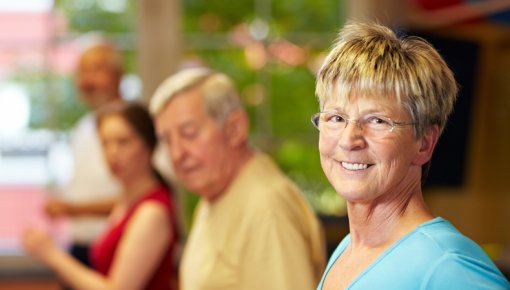Al-Qubaeissy KY, Fatoye FA, Goodwin PC et al. The effectiveness of hydrotherapy in the management of rheumatoid arthritis: a systematic review. Musculoskeletal Care 2013; 11(1): 3-18.
Baillet A, Vaillant M, Guinot M et al. Efficacy of resistance exercises in rheumatoid arthritis: meta-analysis of randomized controlled trials. Rheumatology (Oxford) 2012; 51(3): 519-527.
Baillet A, Zeboulon N, Gossec L et al. Efficacy of cardiorespiratory aerobic exercise in rheumatoid arthritis: meta-analysis of randomized controlled trials. Arthritis Care Res (Hoboken) 2010; 62(7): 984-992.
Björk M, Dragioti E, Alexandersson H et al. Inflammatory Arthritis and the Effect of Physical Activity on Quality of Life and Self-Reported Function: A Systematic Review and Meta-Analysis. Arthritis Care Res (Hoboken) 2022; 74(1): 31-43.
Bundesarbeitsgemeinschaft für Rehabilitation (BAR). Rahmenvereinbarung über den Rehabilitationssport und das Funktionstraining. 2022.
Büssing A, Ostermann T, Ludtke R et al. Effects of yoga interventions on pain and pain-associated disability: a meta-analysis. J Pain 2012; 13(1): 1-9.
Cramp F, Hewlett S, Almeida C et al. Non-pharmacological interventions for fatigue in rheumatoid arthritis. Cochrane Database Syst Rev 2013; (8): CD008322.
Geneen LJ, Moore RA, Clarke C et al. Physical activity and exercise for chronic pain in adults: an overview of Cochrane Reviews. Cochrane Database Syst Rev 2017; (4): CD011279.
Lee MS, Pittler MH, Ernst E. Tai chi for rheumatoid arthritis: systematic review. Rheumatology (Oxford) 2007; 46(11): 1648-1651.
Mudano AS, Tugwell P, Wells GA et al. Tai Chi for rheumatoid arthritis. Cochrane Database Syst Rev 2019; (9): CD004849.
Munneke M, de Jong Z, Zwinderman AH et al. Effect of a high-intensity weight-bearing exercise program on radiologic damage progression of the large joints in subgroups of patients with rheumatoid arthritis. Arthritis Rheum 2005; 53(3): 410-417.
Rausch Osthoff AK, Juhl CB, Knittle K et al. Effects of exercise and physical activity promotion: meta-analysis informing the 2018 EULAR recommendations for physical activity in people with rheumatoid arthritis, spondyloarthritis and hip/knee osteoarthritis. RMD Open 2018; 4(2): e000713.
IQWiG health information is written with the aim of helping people understand the advantages and disadvantages of the main treatment options and health care services.
Because IQWiG is a German institute, some of the information provided here is specific to the German health care system. The suitability of any of the described options in an individual case can be determined by talking to a doctor. informedhealth.org can provide support for talks with doctors and other medical professionals, but cannot replace them. We do not offer individual consultations.
Our information is based on the results of good-quality studies. It is written by a team of health care professionals, scientists and editors, and reviewed by external experts. You can find a detailed description of how our health information is produced and updated in our methods.

